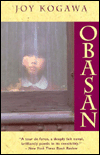
Obasan
Fiction
Finished on 11/12/06
Rating: C (3/10)
1942.
We are leaving the B.C. coast – rain, cloud, mist – an air overladen with weeping. Behind us lie a salty sea within which swim our drowning specks of memory – our small waterlogged eulogies. We are going down to the middle of the earth with pick-axe eyes, tunneling by train to the Interior, carried along by the momentum of the expulsion into the waiting wilderness.
We are hammers and chisels in the hands of would-be sculptors, battering the spirit of the sleeping mountain. We are the chips and sand, the fragments of fragments that fly like arrows from the heart of the rock. We are the silences that speak from stone. We are the despised rendered voiceless, stripped of car, radio, camera and every means of communication, a trainload of eyes covered with mud and spittle. We are the man in the Gospel of John, born into the world for the sake of the light. We are sent to Siloam, the pool called “Sent”. We are sent to the sending, that we may bring sight. We are the scholarly and the illiterate, the envied and the ugly, the fierce and the docile. We are those pioneers who cleared the bush and the forest with our hands, the gardeners tending and attending the soil. With our tenderness, the fishermen who are flung from the sea to flounder in the dust of the prairies.
We are the Issei and the Nisei and the Sansei, the Japanese Canadians. We disappear into the future undemanding as dew.
Kogawa’s prose is beautiful and lyrical:
The laughter in my arms is quiet as the moon, quiet as snow falling, quiet as the white light from the stars. Into this I fall and fall and fall, swaying safe as a feather through all my waiting hours and silent night watchings, past the everyday walk through the woods and the noisy school grounds, down past the Slocan City stores and the sawmill whine and Rough Lock Bill’s cabin, back along the train journey and the mountain ridges and the train station in Vancouver with all the people and the luggage and missionaries and women trotting here and there, carrying babies and boxes. Back up the long bus ride to Marpole and our house and the hedge around the yard and the peach tree outside my window and the goldfish bowl in the music room and I am in my father’s arms again my father’s arms.
In spite of the stunning language, I didn’t care for this book nearly as much as I’d anticipated. I was sympathetic to the individuals in the story and learned quite a bit about how the Japanese (both immigrant and native Canadians) were treated by Canada during the Second World War. Yet, I found the novel lacking some key element to draw me in to the lives of the main characters and their terrible plight. In spite of the educational aspects of the story, I felt it was a bit slow going and struggled to see it through to the end.
Obasan is a work of fiction based on Joy Kogawa's personal experience. Please go here and here for more on her family's story.

Oh well. I hope your next read is a winner. :)
ReplyDeleteThat's too bad that this book wasn't more enjoyable. Sounds like it had potential.
ReplyDeleteJoy, my next read was better! And now my current read is surpassing both, so I'm happy.
ReplyDeleteBooklogged, it did have potential and I feel slightly guilty for not appreciating it better than I did. I think it's an important story to be told - one I'm sure a lot of folk don't know about - but I have a feeling it might have been better if it were written as a biography rather than a novel. It's based on the author's childhood, so the facts are there. Just not the reader-author connection.
Definitely don't bother with the sequel then. I liked Obasan well enough- it's an important story and I found it quite moving. But the sequel, Itsuka, focuses mainly on the political redresss to the Canadian govt. by Japanese Canadians. So historically-speaking, as a Canadian, it was interesting, but rather dry.
ReplyDeleteFor a similar story, the American version in Snow Falling on Cedars was much better, I thought.
Thanks for the heads-up about the sequel, Nat. I saw it while researching Kogawa on the Net. By the way, I thought Snow Falling on Cedars was much better, too.
ReplyDelete